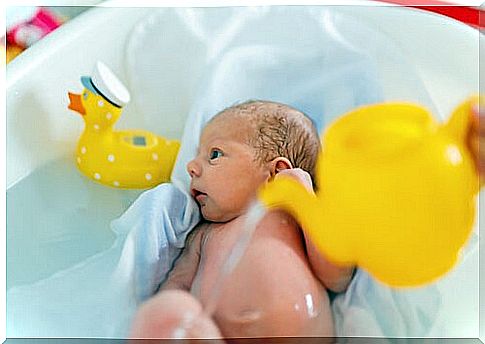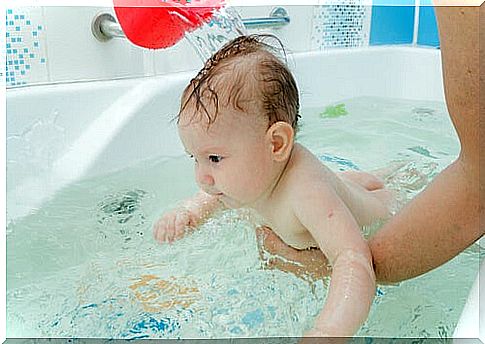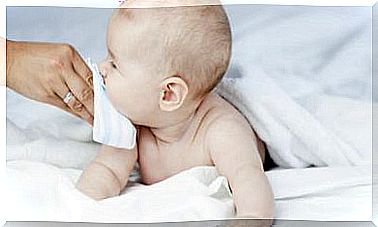6 Tips For The Baby’s First Bath

It is normal for any mother who has given birth for the first time to have doubts and a lot of questions about the baby’s first bath.
The most frequent questions have to do with how to support it so that it does not slip and fall from the arms, when to do it and at what temperature the water should be.
Even if there is a lot of nervousness and fear, going through this experience is something unforgettable. Especially due to the fact that bathing the baby is an opportunity to convey love and security to him. This is why it is useful to be advised: what are the attentions that must be had? What is the most correct way to support it?
1. When is the baby’s first bath recommended?
Specialists recommend bathing the baby for the first time when it is between 7 and 15 days old. At this moment the umbilical cord has already fallen out and, therefore, possible infections are avoided. Furthermore, the duration of the bath should not be excessive: no more than 5 minutes.
2. What is the ideal water temperature for the baby’s bath?
The ideal temperature must be between 36 ° and 37 °. To control it, the mother has to touch the water with her elbow or forearm, as her hands are always used to changes in temperature.
Secondly, the amount of water should be about 10 centimeters. This way the baby will be resting on the bottom of the bathtub and will be able to move around without running any risk.
3. What do you need for the baby’s first bath?
For the baby’s first bath it is essential that the mother has everything ready; this way you will feel safer.
Among the things it must have are: a bathtub or a suitable tub, an area to undress the baby, mild soap, hypoallergenic oil, petroleum jelly, cotton balls for the eyes, cotton buds for the ears and nose, alcohol , a comb, cotton towels and diapers.

6 tips for the baby’s first bath
Babies can become familiar with water from the first day you bathe them, because the water reminds them of where they have been for 9 months: the inside of the womb. For this reason, during the first bath, keep these tips in mind:
- Undress the baby completely and cover him with a towel.
- Gradually dip it into the water so it doesn’t get scared. You must use one of your hands to hold his head and neck up.
- Use very little soap to wash his body; you can start with the chest, arms and hands and then the legs and feet. Afterwards, turn him carefully to wash his back and buttocks.
- After washing his body, you have to continue with his head.
- Clean his eyes with cotton soaked in clean water, not the same water he washed with. You have to clean them from the inside out.
- Once you have washed it , take it out of the water and cover it with a clean towel.
Finally, you must also clean his nose and ears – only outside, never inside – with a cotton swab. Here, the baby is ready to be dressed.
Other recommendations
These are other tips you can consider for after bath time:
- While bathing, you don’t have to leave the baby alone. Likewise, in the first few months, you don’t have to put talcum powder or perfume on it because they can cause allergies.
- Place the tub at a height that is adequate for you. Also, this should be washed before and after the bath.
- Always remember to smile and talk to him while you wash him.
- If the baby starts crying during the first bath, don’t be discouraged, with your caresses and the most appropriate environmental conditions, he will get used to it and start enjoying this pleasant moment.

In conclusion, the baby’s first bath is one of the most beautiful and pleasant moments among those that a mother can experience. Consequently, if you are in your first pregnancy and you are afraid to give him a bath, do not worry, with these tips you will see that everything will be fine.
If you find the right moment, he will relax and start enjoying this moment more. For this, you must give him peace of mind and happiness. If you are very nervous, you can ask a family member or friend for help.









